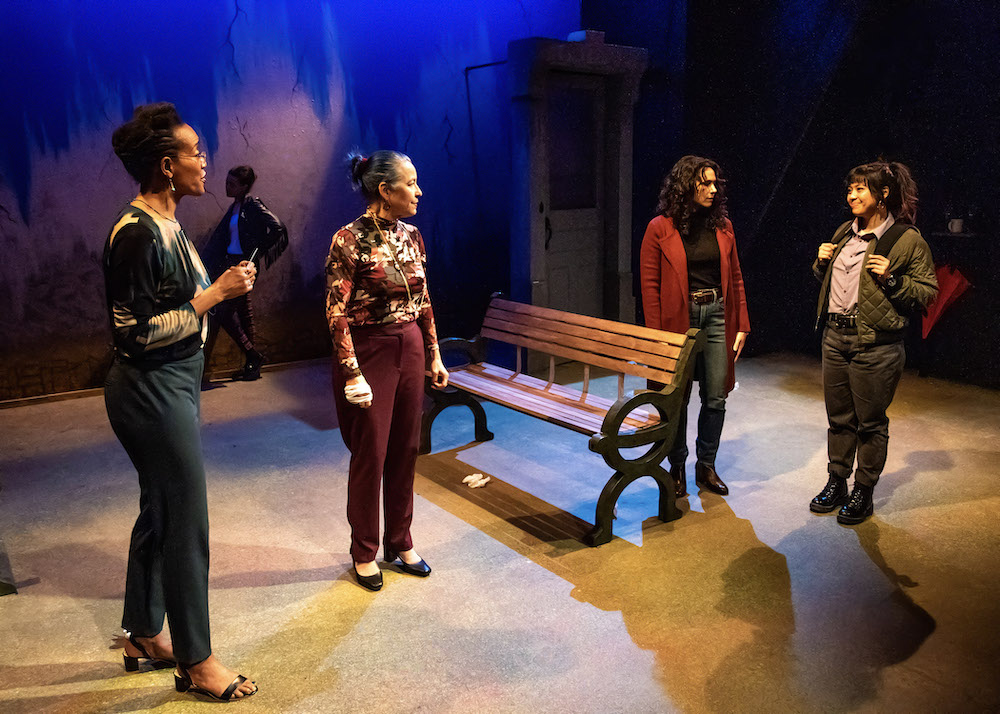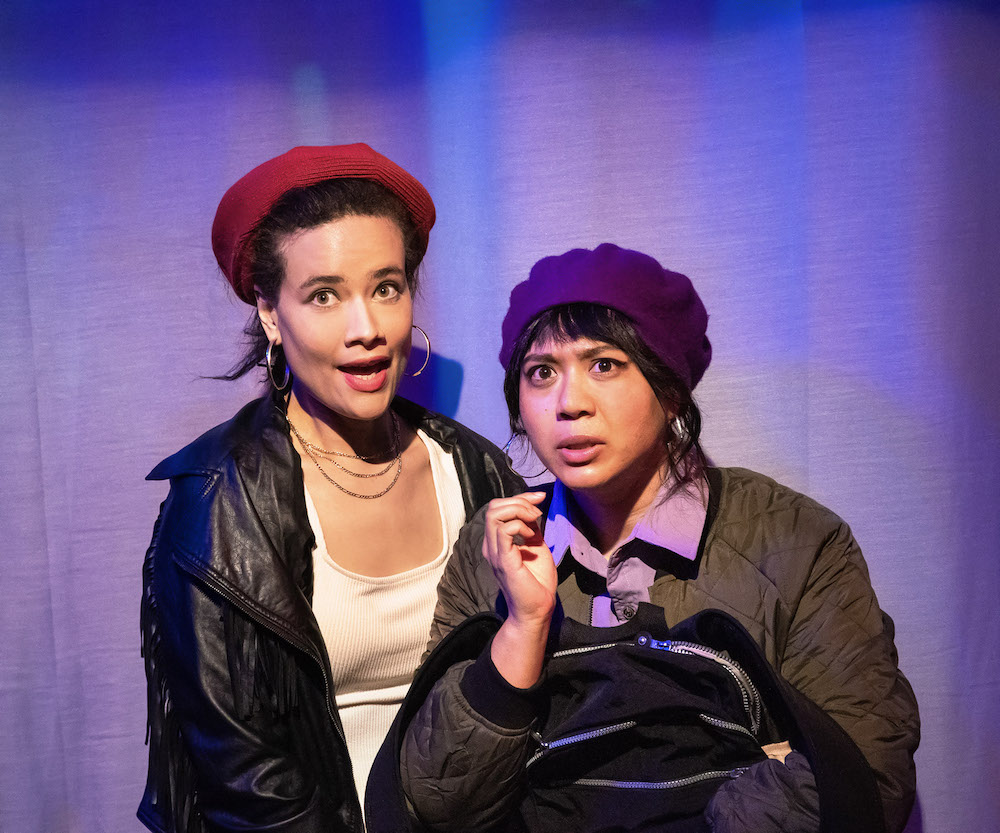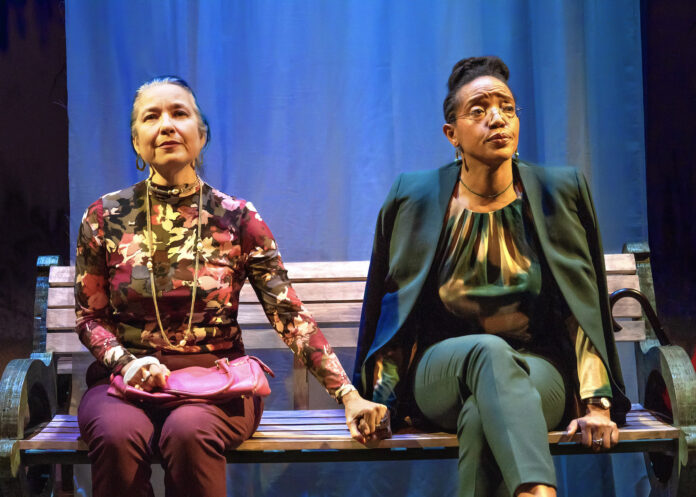I try my best not to be a doomer, but optimism is a full-time job these days—one that doesn’t pay. For example, I’ve never seen real snow in-person and climate change is limiting my number of opportunities to do so in this lifetime. If you’re wondering why I don’t just skip up to Tahoe, I remind you that such trips cost money—which I need to hold onto—and require actual travel, which isn’t safe in a plague-ravaged world.
The characters of Dipika Guha’s Getting There (whose world premiere ran January 20 to February 26 at the New Conservatory Theatre Center) seem to have no such concerns. This brand new one-act from the playwright behind Yoga Play has characters who exist in a world untouched by climate, COVID, or the need for extra cash. Oh, they had problems. In fact, some of them are quite dire. But they all exist in a world out of a Truffaut film. That may explain why this supposedly-modern story felt a bit anachronistic.

Said story, such as it is, starts even before the Getting There‘s literal storyline. A woman (Laura Domingo) casually walks about Deanna Zibello’s gorgeous-in-its-simplicity set representing outdoor Paris. The woman holds a glass of wine as she floats through her own ennui, because she’s French and that’s what they do. (I wouldn’t know. The closest I’ve ever been was Canada and those people hated us for being Yanks. In hindsight, I can’t blame ‘em.) To further emphasize her Frenchness, the play begins with her caught up in a dreamlike musical sequence set to—you guessed it—Édith Piaf’s “Non, je ne regrette rien”.
The storyline proper commences when she encounters an American woman (Lauren Andrei Garcia) who, naturally, won’t stop talking through a forced smile. She’s never been outside the States and she’s in France to see the sights: the Eiffel Tower, Notre Dame, the “Loover,” as she calls it. Our French woman takes pity on this babe in the woods, inviting her back to her flat as a courtesy.
Elsewhere, another obvious Yank (Leigh M. Marshall) is wandering around a train station when she fixes her focus on a French woman (Simone Bloch) waiting for her wife (Desiree M. Rogers) to arrive. Much like the earlier couple, this American also winds up going home with a Frenchwoman she’s only known for 15 minutes, at best.
Through a series of flashbacks and longwinded exchanges, we begin to learn a few more details about our ensemble. We learn that the married couple are a pair of academics, the returning one having just attended an elite conference. We learn that the other wife is a professor who doesn’t have long to live. We learn that the first woman (Domingo) is a graphic designer who claims to not have any regrets about her self-imposed solitude. We learn that the second American woman (Marshall) is looking for her long-lost mother and that the other American actually did pay a cost for her trip, not the least of which was unrequited love.
Guha’s work often aims to shake up the complacency of the American thought process with non-American perspectives; Yoga Play being a fine example. In fact, there’s a moment when our first couple are talking and the American, put off by French candor, gasps, “We don’t speak like this in America.”
“To strangers?” the Frenchwoman asks.
“To anyone.”
Where Guha tends to stumble is in the clarity of feeling toward her characters. I’ve avoided using their names in this review because the play doesn’t share all of the names until it gets close to the end. These ladies are ideas Guha wants to explore rather than human beings. Until the proactive ending, it seems as if things just happen to them.

Director Nailah Harper-Malveaux (who directed Shotgun’s powerful digital production of Loy Webb’s The Light) did what she could to have her cast balance their stereotypical cyphers of the opening scenes with the tragedy-stricken folks they reveal themselves to be by the play’s end. Domingo brought her usual A-game to the proceedings, but she seemed to really struggle with the French accent. I don’t recall the work of either Garcia or Marshall, but the former tapped into “awkward American” quite naturally. I wasn’t fully able to tell if Marshall’s aloof character was truly ditzy or really reserved? Bloch and Rogers (the latter of whom broke hearts last year in Adam Bock’s A Small Fire at Shotgun) are the most intriguing to watch as the married academics. They imbued the couple with a wonderful amount of love and history, making it easy to fully invest in their relationship’s end. All in all, a fine ensemble.
To their credit, NCTC’s one-night, COVID-safe performance was indeed that. It was beyond refreshing to actually have my vaccine QR code scanned. The staff even went after a woman (who thankfully, was masked) who barged past the ushers without going through the vaccine check. Over the course of the 75-minute show, my Aranet4 read CO² levels up to 1256ppm in the small Walker Theatre, but it began to slowly drop by the midpoint. (By pure coincidence, it was the same day Marke and Tim forwarded me a reader’s email, grateful for the regular COVID safety mentions, but confused about my last comment regarding the policies of a major Bay Area theatre. I actually haven’t been to said theatre in months, and I’ve found that venue COVID policies are like Weeping Angels: they change every time you turn around.)
Getting There seemed to want to avoid the very “American in Paris” tropes it pushed hard, though it eventually slides into other archetypes by the play’s end. Fine direction, casting, and design were all entertaining, but the show wasn’t quite on par as a trip to the “Loover.”





